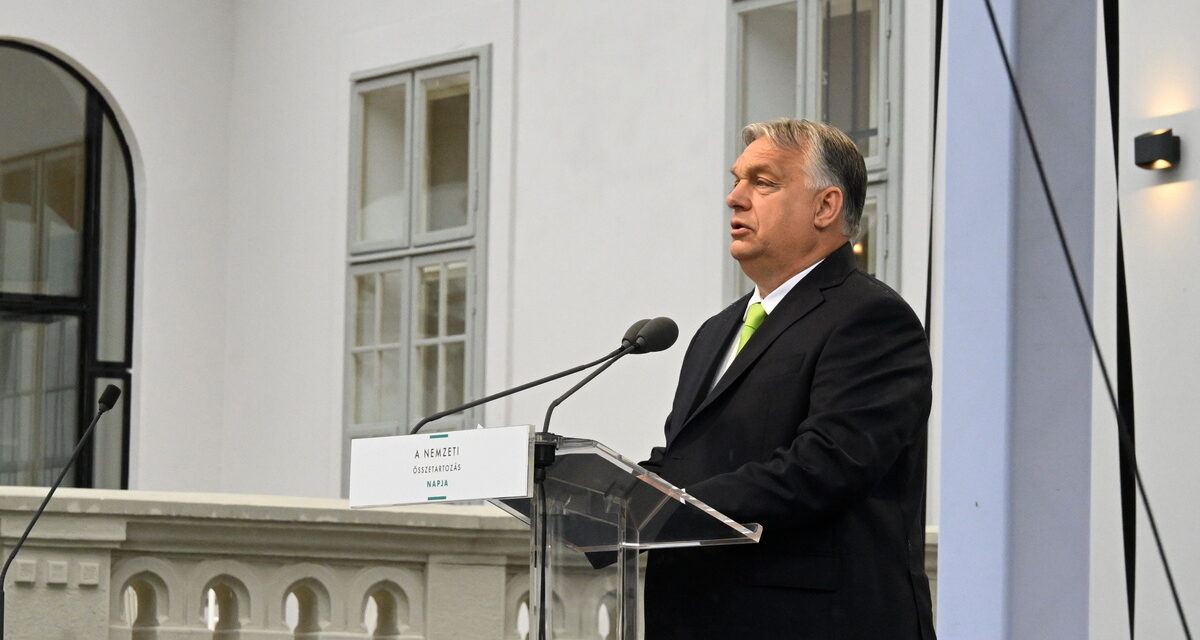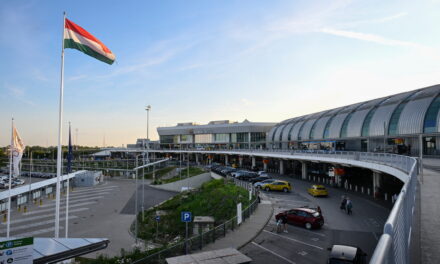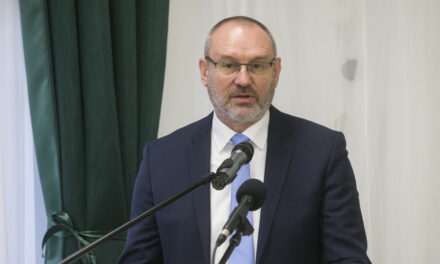"We are restoring and want to patch up the gap created during the Hungarian era. We are taking revenge for our stolen 45 years by connecting Hungary before the German and Soviet occupation with today's," said Viktor Orbán. "We need not only belonging, but also connection. It is not enough to remember the common past, but to dream and plan for the common future," emphasized the Prime Minister in his speech on the occasion of the Day of National Unity.
There are five days until the elections, now we can do what we didn't have the opportunity to do 110 years ago. We can say no to the war in a clear, democratic framework, on behalf of all Hungarians - emphasized Viktor Orbán on the occasion of the Day of National Unity in Geszt, at the ceremonial handover of the Tisza Castle.
Today we pay the debt of the Hungarian nation to the Tisza family
We can boldly say here in Gest, next to the renovated castle of the Tisza family, a stone's throw away from the family's dignified crypt, on the day of National Unity, in the threatening shadow of another war, that today here in Gest, history is condensed. Here is a nation that lost two-thirds of its country as a result of a devastating war a hundred and one-odd years ago, and a third of its people were behind foreign borders - Prime Minister Viktor Orbán began in his speech at the dedication of the Tisza Castle in Geszt on National Unity Day.
This nation did not choose to give in and pass away, but to fight and survive. This nation is now capable of more than commemorating the unjust atrocities that have happened to it every year. It is also capable of declaring its boundless will to live and belonging again and again every year. And he is finally able to pay tribute to the family that has given him so much
said the prime minister.
Because there is also a family here, whose history has merged with the idea of a free, independent and sovereign Hungary.
Today, we discharge the Hungarian nation's debt to them by taking proper care of their home and their family's place. And to leave it to the care of the church, which perhaps never had a more devoted follower than the Tiszák - said Viktor Orbán.
Viktor Orbán emphasized that the Tiszas were on the side of the Transylvanian princes in the battles against the Turks. They then had to fight for a century to regain their ancient property. He added: We were not surprised. Even the Western empire of that time was not in the habit of recognizing and granting the rightful rights of the Hungarians. This is how the family settled in Geszt.
Viktor Orbán pointed out that the last strong and successful era of the Hungarian kingdom was inseparable from the Tisza family. Kálmán Tisza went down in history as a steadfast and successful generalist of dualism. The later prime minister, István Bethlen, remembered his son, István Tisza, as follows: "He died as a martyr to the great cause of the nation, and with him perished the country, the throne, the monarchy and the glory of a thousand years," the prime minister quoted.
His death was not only the loss of an excellent man, not only the loss of a great Prime Minister, but also the painful end of a historical era. Because here is the inevitable date:
June 4, the day of the assassination attempt against the Hungarian nation.
The head of government emphasized: With István Tisza, not only the historical role of a family was completed, but with him the history of the nine hundred-year-old Hungarian kingdom was also interrupted. One hundred and four years ago, we were given a cruel, merciless, unjust dictate. Millions of Hungarians became strangers in their own homeland. There, the best of Hungarian industry and farmland. Our great universities, our most beautiful cities, our cultural values, and the defining scenes of our national memory have moved beyond the border.
The wounds that hurt a nation the most are those that are invisible to the human eye
said Viktor Orbán.
Hungarians are the ones for whom the national wound received at Trianon hurts the most.
From the perspective of all these years, it is already clear that the Trianon Dictator aimed at the death of our nation. But the great powers used to colonization did not know the character of the Hungarians.
They wanted to bury us, but they didn't know we were seeds.
They dug our grave according to the order and manner. The good farmers of the country were put out of business or forced to flee, the Prime Minister declared.
In the darkest hour, our country was put in the hands of people who, even 100 years later, it is difficult to decide whether they were a bigger blow to the country because of their incompetence or bad intentions.
The prime minister quoted Sigmund Freud: "I question whether it can be considered a sign of political wisdom that the smartest of the many counts, István Tisza, is murdered, and the dumbest, Mihály Károlyi, is made prime minister." Let's take this as a lesson! Viktor Orbán added.
He emphasized: the loss of our country 104 years ago was brought about by a war. A war that the prime minister at the time, István Tisza, opposed with every inch of his being. He opposed it at the secret imperial meetings and opposed it in the Hungarian Parliament as well. But the country did not have enough strength to stay out of the war.
We were chained to an empire that kept the issue of war and peace to itself. In both Vienna and Budapest, the attic was full of warmongers, false messiahs, and foreign agents, the Hungarian prime minister added.
Despite the sense of responsibility for the future of the nation and a sober calculation, Hungary had to march with him into a forced war. Tisza knew. That there is a greater tragedy than dragging the nation into a war against its interests is an even greater tragedy. If the nation loses this war. Therefore, when there was no other choice, Tisza did everything to win.
Peace would have remained and the nation would have suffered less.
The war, as opposed by István Tisza, was a war in which not only the vanquished but also the victors lost.
The peace of Europe ended on the day of the Trianon Dictator. The result was not peace in Europe, but a new fear of the next war
Viktor Orbán said.
"Which then caused an even bigger conflagration two decades later," he reminded.
The diktats that ended the war did not bring calm, but new turmoil to the Carpathian basin. New countries were created. And soon much greater ethnic tensions flared up than there were in the former Monarchy, he pointed out.
He added that the artificially assembled state structures were dissolved at the first opportunity.
"That which holds together unites, but that which does not falls apart"
he added.
In the end, countries that could barely survive on their own were formed, which became even more dependent on each other than ever, but because of the invisible wounds of history, looked at each other with hostile eyes, said the Prime Minister.
This is how the Carpathian Basin became first a German, then a Soviet zone of influence and occupation, and that is why Central Europe cannot make its voice heard with sufficient weight even in today's European Union.
But no matter how gloomy the clouds above Central Europe are, a ray of light peeks out at the edge. Today, we have reached the point where the peoples of the Carpathian basin want to be free and sovereign in the end, despite all the imperial scheming, all the geopolitical packing and unsolicited pacts - Viktor Orbán said.
One hundred and ten years ago, the peoples of the Carpathian basin fought against the Hungarians for their sovereignty. One hundred and ten years ago, everyone was still waiting and enjoying the war with joy. The Czechs, the Austrians, the Slovaks, the Romanians, the Serbs and the Croats lived it - said the Prime Minister.
Today, when war threatens again, the people here make it clear to the great powers: we have learned our lesson and we do not want war!
The will of the peoples of the Carpathian Basin is clear: they do not want to be pawns that can be sacrificed again, vassals that can be sent to war on the "imperial chessboard" for the sake of Brussels, Washington, or George Soros.
All of this is said most loudly by the members of the largest community in the Carpathian Basin, we Hungarians. But we know that the others think so too, he stressed.
By now it has also become clear that the peoples living here should not fight for sovereignty against the Hungarians, but can do so together with the Hungarians. The rights of the peoples of Central Europe cannot be defended against the Hungarians, but together with the Hungarians.
On the day of national unity, not only we Hungarians should stick together, but also the peoples of the Carpathian Basin should see each other as partners in life, explained Viktor Orbán.
Viktor Orbán explained: the peoples of the Carpathian Basin should also see each other as partners. He added: we are connected not only by cold geopolitical necessity, but also by common history and something strange and inexplicable.
The similar world view, the central European quality of existence here, he said. According to him
national unity is not only a fact, but also a program. Not only belonging, which is a state, but also connectedness, which is a goal.
Our program is actually a program of national integration, he emphasized.
He said: It is not enough to remember the connecting common past, one must want and plan for a common future.
But first you have to dream about it. One must dream of the glorious future. About the future of a great nation. Which parts of the nation don't care about.
Viktor Orbán said:
Anyone who recommends that we dare to be small is committing a crime against Hungarians.
We are the nation that has a home in every country of the Carpathian basin. We are the ones who make the whole greater than the sum of its parts. We are the ones who have to push for cooperation, solidarity and be happy again and again. Yes, we should also be happy about the successes of our neighbors.
Central Europe is under the same threat today as it was a hundred and ten years ago. Another imperial interest wants to plunge us into war. Here are the warmongers serving the imperial interest again. There are also false messiahs and foreign agents who proclaim that the use of weapons is inevitable, but we know that they are wrong.
War is never inevitable
he emphasized.
War is always the result of human decisions. And in the shadow of weapons, life and justice do not grow, only injustice. Therefore, today we must undertake to accomplish what Prime Minister István Tisza failed to do: We will prevent Hungary from participating in another European war.
Viktor Orbán pointed out: our chances are better today than they were in the final hours of dualism. We are now sovereign, and sovereignty is the personal matter and right of every Hungarian. We elect the government, we hold the powers, we Hungarians decide our own destiny. Now the decisions are not made at secret imperial negotiating tables, where we are always weaker, but in front of the widest possible public in national and pan-European elections.
He emphasized:
There are five days until the elections, now we can do what we didn't have the opportunity to do a hundred and ten years ago, the entire Hungarian population can say no to the war in a clear, democratic framework.
The memory of the Tisza family.
And their authority, even in their dead, deserves, even demands, that we speak frankly. We, today's national government and the huge majority and power behind it, do not destroy, but restore. We don't feel the walls, we don't scratch the paint, we restore, that is, restore. We rebuild, we rebuild. We want to make up for lost time. To mend the rupture in the fabric of Hungarian time. We take revenge on communism by crossing it, said the prime minister. He added: It's as if he never existed. This is how we get our revenge. For our stolen forty-five years to connect Hungary before the German and Soviet occupation with today's Hungary.
Viktor Orbán explained: We are drawing an arc into the twenty-first century, modern Hungary.
This is the original and deepest meaning of the regime change. And we used the two-thirds authorization we received in 2010 for this very purpose and have been using it every day ever since. Today's commemoration is an important and eloquent stage of this huge mission, which perhaps goes beyond our generation. Anyone who comes here now and in the next century can see and understand what the Tiszas wanted. According to him
the motto of our generation is that a match lasts until we win it. The Good Lord is above all of us, Hungary above all! Go Hungary! Hungarians go for it!
Viktor Orbán concluded his speech.
Source: hirado.hu / civilek.info
Cover photo: Prime Minister Viktor Orbán delivers a speech at the inauguration of the renovated Tisza Castle in Gest on the day of national unity, June 4, 2024. MTI/Koszticsák Solid













